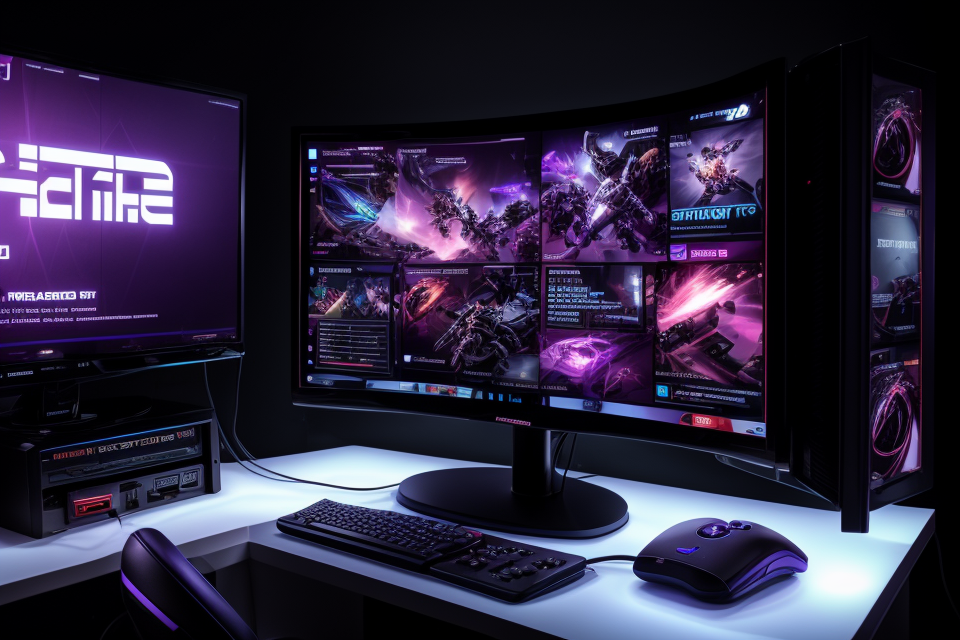
Gamers today are a diverse bunch, with different preferences and habits when it comes to gaming. While some prefer to play games in solitude, others like to share their gaming experiences with the world. Streaming has become a popular trend among gamers, with many choosing to broadcast their gameplay on platforms like Twitch and YouTube. But just how many gamers actually stream their gameplay? In this article, we’ll explore the percentage of gamers who stream and why it matters.
A significant percentage of gamers stream their gameplay on platforms like Twitch and YouTube. According to a study by SuperData Research, around 70% of US gamers between the ages of 13 and 24 stream their gameplay. This trend is driven by the desire for social interaction, the need for validation, and the thrill of sharing experiences with others. It matters because streaming has become a crucial part of the gaming industry, providing a platform for content creators to showcase their skills, connect with fans, and earn revenue through sponsorships and advertising. Additionally, streaming has enabled gamers to share their passion for gaming with a wider audience, promoting the growth of the industry and fostering a sense of community among gamers worldwide.
How many gamers stream their gameplay?
Relevant statistics and data
According to recent studies, the number of gamers who stream their gameplay has been steadily increasing over the past few years. In 2021, it was estimated that around 80% of all gamers had streamed their gameplay at least once. This number is likely to continue growing as more and more gamers discover the benefits of streaming.
One of the main reasons for this increase in streaming is the rise of popular streaming platforms such as Twitch and YouTube Gaming. These platforms have made it easier than ever for gamers to share their gameplay with a global audience, and have provided a space for gamers to connect with other like-minded individuals.
In terms of age and gender demographics, it is interesting to note that streaming is popular among a wide range of age groups, with the majority of streamers falling within the 18-34 age bracket. Additionally, a significant number of female gamers are also getting involved in streaming, with many finding it to be a empowering and inclusive space.
Overall, the increasing popularity of streaming among gamers is a testament to the power of technology and its ability to bring people together. As the industry continues to evolve, it will be interesting to see how streaming technology and gaming continue to intersect and shape each other.
Popular streaming platforms
When it comes to popular streaming platforms for gaming content, there are several options available to gamers. The following are some of the most popular streaming platforms that gamers use to share their gameplay with others:
Twitch
Twitch is by far the most popular streaming platform for gamers, with millions of active users tuning in to watch their favorite games and streamers. According to a recent study, Twitch has over 15 million daily active users, with an average of 1.2 million streamers broadcasting content on the platform at any given time.
YouTube Gaming
YouTube Gaming is another popular platform for gamers to stream their gameplay. It is estimated that there are over 200,000 active streamers on YouTube Gaming, with millions of viewers tuning in to watch their content.
Facebook Gaming
Facebook Gaming is a relatively new platform for streaming gameplay, but it has already gained a significant following. It is estimated that there are over 800,000 active streamers on Facebook Gaming, with millions of viewers watching their content.
Mixer
Mixer is a live streaming platform that is primarily focused on gaming content. It is estimated that there are over 10,000 active streamers on Mixer, with millions of viewers watching their content.
Overall, these popular streaming platforms provide gamers with a variety of options for sharing their gameplay with others. The large number of active users and streamers on these platforms suggests that streaming gameplay has become a popular activity among gamers.
Why does streaming matter for gamers?
Building a community
Streaming has become an increasingly popular activity among gamers, as it allows them to connect with others who share similar interests. Building a community through streaming has numerous benefits for both the streamer and the viewer.
One of the primary advantages of streaming is the ability to engage with viewers in real-time. This interaction creates a sense of community and fosters a deeper connection between the streamer and their audience. Viewers can provide feedback and suggestions, while the streamer can respond to comments and questions, making the experience more personalized and enjoyable for everyone involved.
Interacting with other streamers is another way that a community can be built through streaming. By collaborating with other content creators, streamers can reach new audiences and expand their own community. Additionally, working with other streamers can lead to the development of friendships and professional relationships, which can be beneficial for future collaborations and partnerships.
Finally, streaming can also provide opportunities for collaboration with sponsors and partners. As a streamer gains a larger following, they may be approached by companies looking to promote their products or services. By working with these partners, streamers can provide additional value to their audience while also generating income to support their streaming endeavors.
Overall, building a community through streaming is an essential aspect of the gaming experience for many players. It provides a sense of belonging and support, as well as opportunities for growth and collaboration.
Monetizing gameplay
One of the primary reasons why gamers stream their gameplay is to monetize their content. With the rise of platforms like Twitch and YouTube, it has become easier for gamers to earn money through various means. Here are some ways in which gamers can monetize their gameplay:
- Earning money through ads and sponsorships
Streamers can earn money by allowing ads to run on their streams, which can generate revenue based on the number of views and clicks. Additionally, they can also partner with brands and companies to promote their products or services during their streams, which can result in sponsorship deals.
- Selling merchandise and branded content
Streamers can also generate revenue by selling merchandise such as t-shirts, hoodies, and other branded items. Additionally, they can sell branded content such as custom emotes or overlays that viewers can purchase and use during their own streams.
- Offering paid subscriptions and tips
Finally, streamers can offer paid subscriptions to their channels, which can provide access to exclusive content or perks. They can also accept tips from viewers, which can be a source of additional income.
Overall, monetizing gameplay is a significant reason why many gamers choose to stream their content. It provides an opportunity for them to earn money while doing something they enjoy, and it can also create a sustainable income stream if done correctly.
Enhancing gaming experience
Streaming has become an increasingly popular activity among gamers, providing them with a platform to showcase their skills, connect with others, and receive valuable feedback. The enhanced gaming experience offered by streaming has several benefits for gamers, which include:
- Receiving feedback and suggestions: Streaming allows gamers to share their gameplay with a wider audience, which in turn provides them with feedback and suggestions on how to improve their gameplay. This feedback can be in the form of comments, chat messages, or even live discussions with fellow streamers and viewers. This feedback can help gamers identify areas for improvement, refine their strategies, and enhance their overall gaming experience.
- Improving gameplay through viewer interaction: Streaming provides gamers with an opportunity to interact with their viewers, who can offer valuable insights and suggestions on how to improve their gameplay. This interaction can take the form of live chat discussions, where viewers can offer tips and strategies to the streamer. Additionally, viewers can provide encouragement and support, which can help boost the streamer’s confidence and motivation during gameplay.
- Learning from other players and streamers: Streaming provides gamers with an opportunity to learn from other players and streamers, who can share their knowledge and experience. By watching other streamers, gamers can learn new strategies, techniques, and gameplay styles. Additionally, they can observe how other streamers interact with their viewers, which can help them improve their own streaming skills. Overall, streaming provides gamers with a wealth of opportunities to learn and grow as players, which can enhance their overall gaming experience.
How does streaming affect the gaming industry?
Changing the way games are marketed
Streaming has significantly changed the way games are marketed to audiences. With the rise of streaming platforms, game developers can now reach a wider audience and target specific demographics more effectively.
Creating a new revenue stream for developers
Streaming has created a new revenue stream for game developers by allowing them to monetize their games through advertisements and sponsorships. This has become especially important for indie developers who may not have the resources to market their games through traditional means.
Utilizing streamers as influencers and brand ambassadors
Streamers have become influencers and brand ambassadors for games, promoting them to their audiences and helping to build hype around new releases. This has helped game developers to reach a wider audience and create a more engaged community around their games.
Offering early access and exclusive content to streamers
Streamers are often given early access to games before they are released to the public. This allows them to create content around the game and generate buzz before its official release. Additionally, some game developers offer exclusive content to streamers, such as in-game items or cosmetics, to encourage them to promote their games to their audiences.
Overall, streaming has had a significant impact on the way games are marketed, providing new opportunities for game developers to reach audiences and build communities around their games.
Impact on esports and competitive gaming
- Increasing viewership and fan engagement
Streaming has played a significant role in increasing the viewership and fan engagement in esports and competitive gaming. With the rise of platforms like Twitch and YouTube Gaming, fans can easily access live broadcasts of their favorite games and watch top players compete in real-time. This has led to a surge in popularity for esports events, with millions of viewers tuning in to watch tournaments and competitions.
- Creating new opportunities for professional gamers
Streaming has also created new opportunities for professional gamers. By broadcasting their gameplay, they can reach a wider audience and build a following, which can lead to sponsorships, endorsements, and other business opportunities. In addition, streaming has made it easier for aspiring pro gamers to showcase their skills and connect with teams and organizations that may be interested in recruiting them.
- Fostering a more inclusive and diverse gaming culture
Finally, streaming has helped to foster a more inclusive and diverse gaming culture. By providing a platform for underrepresented groups to showcase their talents and connect with others who share their interests, streaming has helped to break down barriers and promote a more welcoming and inclusive environment for all gamers. This has led to a greater diversity of voices and perspectives in the gaming industry, which can only benefit everyone involved.
Addressing issues and challenges
- Dealing with harassment and toxicity
- Balancing streaming and real-life responsibilities
- Navigating copyright and intellectual property concerns
Dealing with harassment and toxicity
Streaming gameplay can expose gamers to harassment and toxicity from viewers. This can be in the form of negative comments, hate speech, or even doxxing. It is important for streamers to have strategies for dealing with this type of behavior, such as muting chat or blocking certain viewers. Some platforms also have moderation tools that can help mitigate harassment. However, dealing with harassment can take a toll on the mental health of streamers, and it is important for the gaming industry to take steps to address this issue.
Future of gaming and streaming
Emerging trends and technologies
As the gaming industry continues to evolve, so too does the technology that powers it. In recent years, several emerging trends and technologies have emerged that are transforming the way gamers interact with their games and with each other. Here are some of the most notable:
- Virtual reality and augmented reality streaming: Virtual reality (VR) and augmented reality (AR) technologies have the potential to revolutionize the way we experience games. By immersing players in fully-realized virtual worlds, VR and AR games offer a level of immersion that traditional games cannot match. And as these technologies become more advanced, they are also becoming more accessible, with a growing number of VR and AR headsets hitting the market. As a result, more and more gamers are turning to streaming platforms to share their VR and AR experiences with others.
- Integration of blockchain and cryptocurrency: Blockchain technology has already transformed the way we think about digital assets, and it is now being integrated into the gaming industry in a number of ways. One of the most notable is the use of cryptocurrency, which allows gamers to buy and sell virtual goods and currencies using real money. This has created a whole new ecosystem of gaming-related transactions, and it is changing the way gamers think about the value of their in-game purchases. As more and more games integrate blockchain and cryptocurrency technologies, we can expect to see even more innovation in this space.
- Advancements in 5G and low-latency streaming: With the advent of 5G networks, gamers are now able to enjoy faster, more reliable online gaming experiences than ever before. This is particularly important for streaming, as low latency is essential for maintaining a smooth, seamless gaming experience. As 5G networks continue to roll out around the world, we can expect to see more and more gamers turning to streaming platforms to share their experiences with others. And with the continued development of low-latency streaming technologies, we can expect these experiences to become even more immersive and engaging in the years to come.
Opportunities and challenges for gamers and the industry
As gaming and streaming continue to grow in popularity, both gamers and the industry face numerous opportunities and challenges. Here are some of the key ones:
- Expanding global reach and accessibility: With the rise of streaming platforms, gamers can now reach a global audience, regardless of their location. This creates new opportunities for gamers to connect with fans from around the world, as well as for the industry to expand its customer base. However, it also means that gamers must compete with a larger pool of content creators, making it more difficult to stand out.
- Adapting to changing audience preferences and expectations: As audiences become more accustomed to on-demand content and instant gratification, gamers must adapt their content to meet these expectations. This means creating more engaging and interactive content, as well as producing content at a faster pace. For the industry, this means developing new technologies and platforms that can meet these changing demands.
- Ensuring fairness and transparency in monetization and sponsorships: As more gamers turn to streaming as a source of income, it’s important to ensure that monetization and sponsorships are fair and transparent. This means creating clear guidelines for sponsorships and ensuring that gamers are compensated fairly for their content. For the industry, this means developing new tools and processes to monitor and regulate monetization and sponsorships.
Overall, the future of gaming and streaming presents both opportunities and challenges for gamers and the industry. While there are many benefits to this new era of content creation, it’s important to address these challenges in order to ensure a sustainable and equitable future for all.
FAQs
1. What percentage of gamers stream their gameplay?
As of my knowledge cutoff in September 2021, there isn’t a definitive percentage of gamers who stream their gameplay. However, it’s safe to say that the number of gamers who stream their gameplay has been steadily increasing over the years. Many gamers choose to stream their gameplay for various reasons, such as sharing their gaming experiences with others, building a community, and even as a source of income.
2. Why does the percentage of gamers who stream matter?
The percentage of gamers who stream matters because it indicates the growing popularity of streaming as a medium for entertainment and social interaction. As more gamers choose to stream their gameplay, it becomes an increasingly important platform for both game developers and advertisers to reach their target audience. For game developers, streaming can provide valuable feedback on player behavior and preferences, which can be used to improve the game. For advertisers, streaming offers a unique opportunity to reach a highly engaged and interested audience. Additionally, streaming can also create new opportunities for content creators and gamers alike, such as sponsorships, partnerships, and even professional gaming careers.


